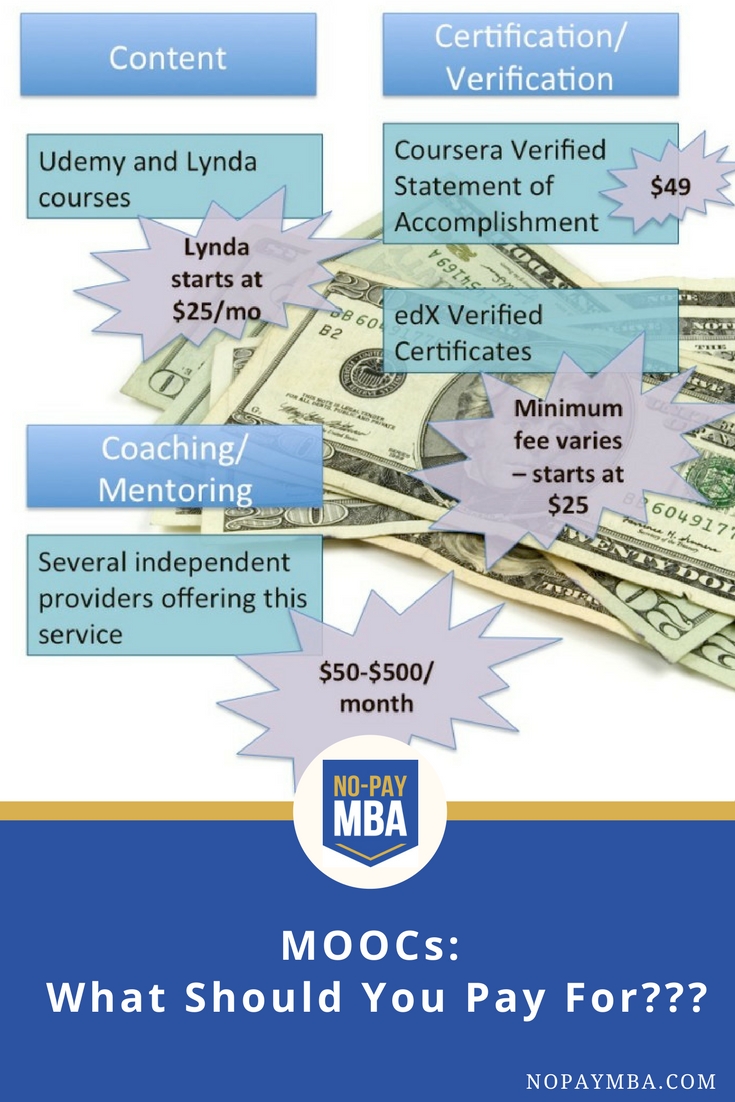by Laurie Pickard | Feb 28, 2015 | MOOC MBA Design, Thoughts on Higher Ed and Life

As the MOOC providers search for viable revenue models, the number of things you can pay for in the MOOC world has exploded. From subscription sites like Lynda, to micro-credentials like Udacity’s Nanodegrees and Coursera’s Specializations, the array of options is dizzying. None is as expensive as regular college credit, but fees for MOOCs now range from free with an option to pay $50 for a verified certificate (Coursera, edX), to upwards of $900 for a single course (NovoEd), to $200 per month for access to as many courses as you can handle (Udacity, Lynda).
In the early days of massive open online courses you couldn’t pay for a course or a certificate if you wanted to.
In my opinion, the proliferation of non-free options is a good thing; it is only by having sustainable business models that the MOOC platforms will be able to stay in existence and continue producing high-quality content.
But given that all of these products are new and unproven, as a MOOC student it can be confusing to sort through them.
What is your goal and how much can you afford?
Just over a year ago, an article about the No-Pay MBA went viral. The headline made reference to a figure of $1000, which was how much I planned to spend on my MOOC-based MBA equivalent. That original estimate of $1000 was actually what I planned to spend to build my website – including hosting, the price of the site itself, some help from people who know more about the internet than I, and other assorted fees associated with running a website. I had not at that time – and in fact I still haven’t – spent any money on courses themselves. To be precise, mine is not a $1000 education, but rather a free education with a $1000 website.
There are a lot more ways to spend $1000 on online learning now than there were a year ago, but the approach I would recommend hasn’t changed.
- First, get very clear about your goals.
- Second, determine how much money you can afford to spend to reach those goals.
- Finally, when deciding how to spend that money, look for those options that do some combination of the following:
- Give you access to specialized content
- Provide you the motivation to finish your courses
- Lend credibility to your studies
When I started this project, I didn’t need to pay for specialized content, since the content I needed was available for free. But I did need to find a way to bring credibility to my effort – and to stay motivated enough to see it through. Building a website was the best way to build credibility for online learning, and being accountable to my readers has been critical to maintaining the motivation I need to complete my courses.
Fortunately, you have many options when it comes to accessing specialized content, maintaining motivation, and building credibility. With those key principles in mind, here is my take on what you should pay for when it comes to online education.
Certificates and identity-verified certificates
What they are
Most MOOC platforms give certificates – free or paid – to indicate a student’s completion of a course. Coursera and edX also offer an identity-verified certificate to ensure that the student who holds the certificate is the person who did the work for the course.
How much they cost
Coursera and edX will give you a basic certificate for free. Future Learn and MiriadaX offer paid certificates (£29 and €40, respectively). Coursera’s identity-verified Statement of Accomplishment costs $49 per course. edX verified certificates are on a sliding scale, with prices typically starting at $25 or $50 per course.
Worth it?
If you need the extra motivation, yes. I’ve written a more detailed analysis of the value of identity-verified certificates, but when it comes to credibility, I don’t think these fancier certificates are worth the expense – unless paying for the certificate will give you the motivation you require to finish the course. Of course, you may want to support a non-profit like edX, or the course may be part of a longer series which requires identity-verification for the overall cert. Which brings me to the next option.
Micro-credentials
What they are
Series of courses packaged into sets. Udacity’s Nanodegrees are primarily for IT topics. Coursera has partnered with Wharton to offer a Business Foundations Specialization. edX offers a Specialization in Supply Chain Management.
How much they cost
Udacity charges $200 per month, so the more quickly you finish, the less you spend. Coursera charges $595 for its Business Foundations Specialization ($95 per identity-verified course certificate, plus $215 for a capstone project). edX charges $375 for the Supply Chain Management series.
Worth it?
A pretty good bet. Micro-credentials are still very new, but with employers now collaborating on their design, they are likely to look very good on a resume. Good enough to replace a degree? Not yet, but who knows what the future will bring.
Course content
What it is
Some sites require you to pay just to access their content. The most popular of these sites are Lynda, Udemy, and Udacity.
How much it costs
Varies significantly - $25 per month for a basic Lynda subscription, from $40 to $200 for most coursees on Udemy, $200 per month on Udacity.
Is it worth it?
Yes, if you can’t get the content for free somewhere else, and if you’ll use it consistently.
Mentorship/Coaching
What it is
Support from a tutor or coach as you work your way through the course content. Udacity offers limited coaching in its Nanodegrees. Sites like Thinkful and SlideRule specialize in coaching students through courses on coding and programming.
How much it costs
Part of the monthly fee on Udacity, SlideRule charges $400 per month, and Thinkful charges $500 per month. I offer more affordable packages, starting at $50 per month. You can learn more about No-Pay MBA coaching packages here.
Worth it?
Yes. Not many options exist yet for business students – this service is primarily geared towards IT courses – but having someone there to help you along is key to course completion, especially for difficult subjects.
by Laurie Pickard | Feb 24, 2015 | Courses, Platforms, and Profs, Thoughts on Higher Ed and Life

Christian Terwiesch is a professor at the University of Pennsylvania’s Wharton Business School. He teaches a popular MOOC, Introduction to Operations Management, which I took last year. That course, along with three other Wharton courses, now form part of the newly launched Business Foundations Specialization from Coursera.
Professor Terwiesch is also a thought leader when it comes to MOOCs and their potential for disruption in the market for business education. Along with Karl Ulrich, another Wharton professor, he authored an excellent paper called “Will Video Kill the Classroom Star?”, which explores the ways in which business schools and professors might come under pressure from new educational technology.
I caught up with Professor Terwiesch recently, and we talked about the Coursera-Wharton Specialization, as well as his current thinking on the future of business education.

LP: I want to start by thanking you. I took your course last year, I greatly enjoyed it, and I learned a lot from it. So thank you for offering it.
CT: I love your story. It’s these kind of stories that make the Coursera world so exciting.
LP: I’d like to ask you about the new Specialization from Coursera that involves all the Wharton courses. I want to ask you about who you imagine will use this and benefit from it the most. Who was the team imagining when the Specialization was created?
CT: I think this is about realizing that we have only a certain number of seats for people coming here to Philadelphia or to San Francisco to take Wharton courses. But there is much more demand, many more people who are interested in business knowledge provided by Wharton. Many people cannot come because they don’t have the financial means, many people cannot come because of geographic constraints. Through Coursera, these folks can get a sense of what Wharton is like without paying the money that you would have to pay to come here, and without moving to Philadelphia.
LP: I’m very excited about the Coursera Specialization, mostly for the possibilities that it opens up. We’re seeing more Specializations and things of this nature, and they are becoming more sophisticated with the inclusion of capstone projects and the involvement of businesses. What do you think we’ll see next in terms of offerings from the MOOC platforms?
CT: I doubt that in the foreseeable future we will be granting a degree based on MOOCs. But the trend goes towards using these courses first in the admissions process, then to start giving credit for them. So it’s only a question of time as to who offers a degree based on them. Certainly on the degree side I would think that the elite institutions will be the most conservative. But it is a trend. That train is rolling.
LP: I read “Will Video Kill the Classroom Star?” which you wrote last year with Karl Ulrich. I loved it, and I wanted to ask you some questions about it. You raised an important point, which is that MOOCs and the like will have a small effect, or even no effect, on top schools like Wharton. What do you expect will be the effect on other business schools?
CT: If you look at the full time MBA programs and you’re not in the top schools – if you are, let’s say, somewhere in the rankings below 50, you already start feeling the heat.
People are increasingly less willing to give up their work, move to a remote place for a two-year education that they could get online.
The same is true now in the executive MBA market, where people say, “I need this for my job, but why should I spend $100,000 for an MBA from the University of Nowhere if I can get it online from Harvard or from Wharton?”
Like it or not, for the business schools, MOOCs are not the great equalizer. As with other examples in globalization and technology, the rich get richer, and the poor get poorer. But, this is the perspective of the schools. For the people, fortunately, I think it’s the opposite. I think it’s wonderful because MOOCs help close the inequality gap. We can provide an Ivy League education to everybody, even if they didn’t have the grades in high school or the means to come here.
LP: As someone who’s studying while working I feel that I get an added benefit from being able apply some of what I’ve learned immediately at work - it’s not just that I’m avoiding the opportunity cost involved with taking time off of work. I have to think this is something that’s attractive to employers as well, and I wanted to hear what you think about that.
CT: We call this “learning on demand” – much smaller chunks of knowledge, studied and applied in real time. I think there’s lots of power in that business model. So will the employers go after it? That could be a real threat to us. I think that’s too early to say right now, but I certainly think that our big recruiters – McKinsey, Goldman, Google – if they all went down that path, that would be the biggest threat to our existence. The question is, could we as Wharton deliver this content on demand, or would McKinsey or Google just say “we’re going to cherry pick the content across all the courses that are available in this online learning space, and then people would study as they’re working for us”. Then we don’t need Wharton anymore. The problem with that model for the business schools is this whole idea of certification.
Certification is really only needed if you have studied for a long time and you haven’t deployed these skills. If you study a new skill and then deploy it the next day, I don’t need to certify you anymore.
You can just write on your CV how you’ve completed a successful merger or acquisition. I don’t need to write you a certificate that you’ve studied it. You actually are self-certified for having been successful on the job. So that I think is a big threat to our existence.
LP: Do you think that’s inevitable? Or is there still a market in which a certification could be highly valuable?
CT: Let’s start with the undergraduate market. Is somebody really going to go and take a high school student and throw them on the job and say you’re going to learn on demand? A young person needs a couple of years of personal development, some education, and because of our scale, we can provide both of this efficiently and at high quality. In the MBA case, it’s a little less clear whether that is the right model to deliver the knowledge. We’re back to this observation that we made in the paper that you really have to think of the business school as a bundle of services that we provide. There is the learning, there is the certification, but there are other aspects around networking, career management, and fun that you would lose if you acquire your knowledge on-demand. As long as we keep the learning as an integral part of a broader experience we will provide our service with a certain integrity that cannot be unbundled.
LP: I want to push you on that. Clearly the content can be unbundled. Do you see other opportunities for entities outside the university to capture other pieces of the bundle?
CT: Well my joke has always been that I’m afraid of a merger between Coursera and Club Med. If our story is that the experience of being around other students and the social interaction is so critical to what we do, then look, that is what Club Med is built around. You sprinkle in Coursera with the content. If those two merge, you have a business school. It’s a joke, but I think there’s some truth in it. There’s no reason to believe that we are the only place in the world where you could have a good time and learn something.
LP: I have one final question for you which is something very dear to my heart, and that is to hear your thoughts on the potential for MOOCs to increase access to business education in the developing world.
CT: As a research university we have a very funny business model where you write an academic paper for hundreds of thousands of dollars and then give them away for free. We train doctoral students at the expense of hundreds of thousands of dollars, and then they go and work for our competitors. We are used to doing work which benefits others. So which customer would be more honorable to serve than the poorest members of our globe? The more we can have these courses be delivered in regions that typically don’t have access to education at our level, or even within the US, a society with large income discrepancies, the more we are true to our mission as a university.
by Laurie Pickard | Feb 9, 2015 | Career Development, Community and Networking, MOOC MBA Design, Most popular posts
I’m pleased to share a guest post by Nick Switzer, who offers a tremendous example of how a MOOC MBA can be even more valuable than a traditional MBA. For those considering a No-Pay MBA, I expect you’ll find his story as inspiring and intriguing as I did. Enjoy! -Laurie
Why I turned down a company-paid MBA for a No-Pay MBA
 Everyone pursuing a No-Pay MBA is doing so because they cannot afford a traditional paid, brick and mortar MBA, right? A No-Pay MBA is the only option; otherwise, we would all enroll in traditional MBAs, right?
Everyone pursuing a No-Pay MBA is doing so because they cannot afford a traditional paid, brick and mortar MBA, right? A No-Pay MBA is the only option; otherwise, we would all enroll in traditional MBAs, right?
Not necessarily.
I work for a fantastic company with great benefits. One of those benefits is tuition reimbursement. If I take university courses that pertain to my role at the company, then the company pays for my tuition. As an engineer transitioning to a more business-oriented engineering role, I needed some financial and business training. My managing director (let’s call him Steve) knew this, and during a one-on-one lunch he suggested that I pursue a traditional MBA, taking advantage of the company’s tuition reimbursement policy.
I was flattered. Steve was my manager’s manager, a role model in the company, and he was telling me that the company would fund my MBA! However, after some deliberation, I declined this offer in favor of a No-Pay MBA using Coursera and other MOOC providers.
Why did I do this? How could I turn down such a generous benefit from my company?
I’ll give you 5 big reasons.
1. I value my time with my family.
When I started my No-Pay MBA, my wife and I were expecting our first child. My wife was a successful marketing manager for a Fortune 500 company at the time, with no plans to leave her role after maternity leave. I was committed to supporting her career, our family development, and my own career. I did not think it was possible to both perform well at my job and be a supportive father and husband, all while attending MBA classes and studying.
With a No-Pay MBA, I watched half of each weeks’ lectures in the same amount of time I would have spent in traffic commuting to off-site classes. Often I would do my courses while my child was sleeping, either early in the morning or late at night.
In this way, MOOCs allowed me to maximize time with my family.
2. I needed to learn quickly and apply my skills immediately.
In my new role, I needed business strategy and finance understanding immediately! Time lost taking the GMAT, GRE, selecting a program and applying meant real business opportunities lost. Through MOOCs, I was able to access top educational content within minutes of choosing my courses!
By the time director Steve suggested I start a paid MBA, I had already started 2 courses that were paying dividends in the office.
I immediately applied principles learned in class in the workplace with many co-workers who had graduated with paid MBAs, honing my learning in real-life scenarios.
Unlike a traditional MBA, I have the ability to share course materials directly with my co-workers as well. This has resulted in empowering my project teams to learn principles on the fly, when they need them most.
3. I wanted to choose my courses based on what would be most helpful at work.
One of the things I love most about MOOCs is the ability to craft my own curriculum.
I have a passion for data-driven decisions, so I am taking a 10-course Data Science specialization from Johns Hopkins as a focal point in my No-Pay MBA.
This type of curriculum flexibility and the ability to take courses from multiple top universities is simply unbeatable.
This was also helpful to my company because I was able to take the courses I needed immediately. I needed financial analysis and negotiation strategy, and I was able to take those courses right away.
4. I saved my company a lot of money.
In the recession of 2008, many companies suspended their tuition reimbursment programs for at least 6 months. I did not want to see my further education as a financial burden to my company.
As a responsible employee of my company, I made a serious cost-saving decision in pursuing a No-Pay MBA. This was an easy point for my director to understand.
My company is still investing in me, more in time commitment than in cash. This investment has paid off quickly, as my No-Pay MBA has armed me with frameworks that allow me to attack problems quickly.
5. I want MOOCs to succeed!
I believe broad, low-cost access to excellent educational materials will help our world, enriching lives and offering new paths to personal achievement and more stable economic conditions.
I want my daughters to live in a world where they have access to top-notch education without going into significant debt.
I want to see MOOCs succeed. What better way to help this happen than as a living example of the power of low-cost online education?
The Results
 Since I started my No-Pay MBA, my wife and I have been fortunate enough to have two great little daughters. My wife has been promoted, and because our schedules aren’t in conflict, she has been able to go on several international work-trips while I take care of the kids after work.
Since I started my No-Pay MBA, my wife and I have been fortunate enough to have two great little daughters. My wife has been promoted, and because our schedules aren’t in conflict, she has been able to go on several international work-trips while I take care of the kids after work.
On the job, I use frameworks and concepts from my courses every day. Thanks to my No-Pay MBA, I am totally comfortable having high-level financial and business strategy discussions with graduates from traditional MBA programs. I have also earned a promotion since starting this adventure in non-traditional education.
Bottom line: a No-Pay MBA aligned better with my goals of work-life balance and prioritization of my family than a standard MBA would have. It has been fantastic for my family, for my company and for me.
Nick Switzer is an engineer, a German-English technical translator, and a lifelong learner. To see his complete MOOC MBA transcript, visit www.nickswitzer.us.








